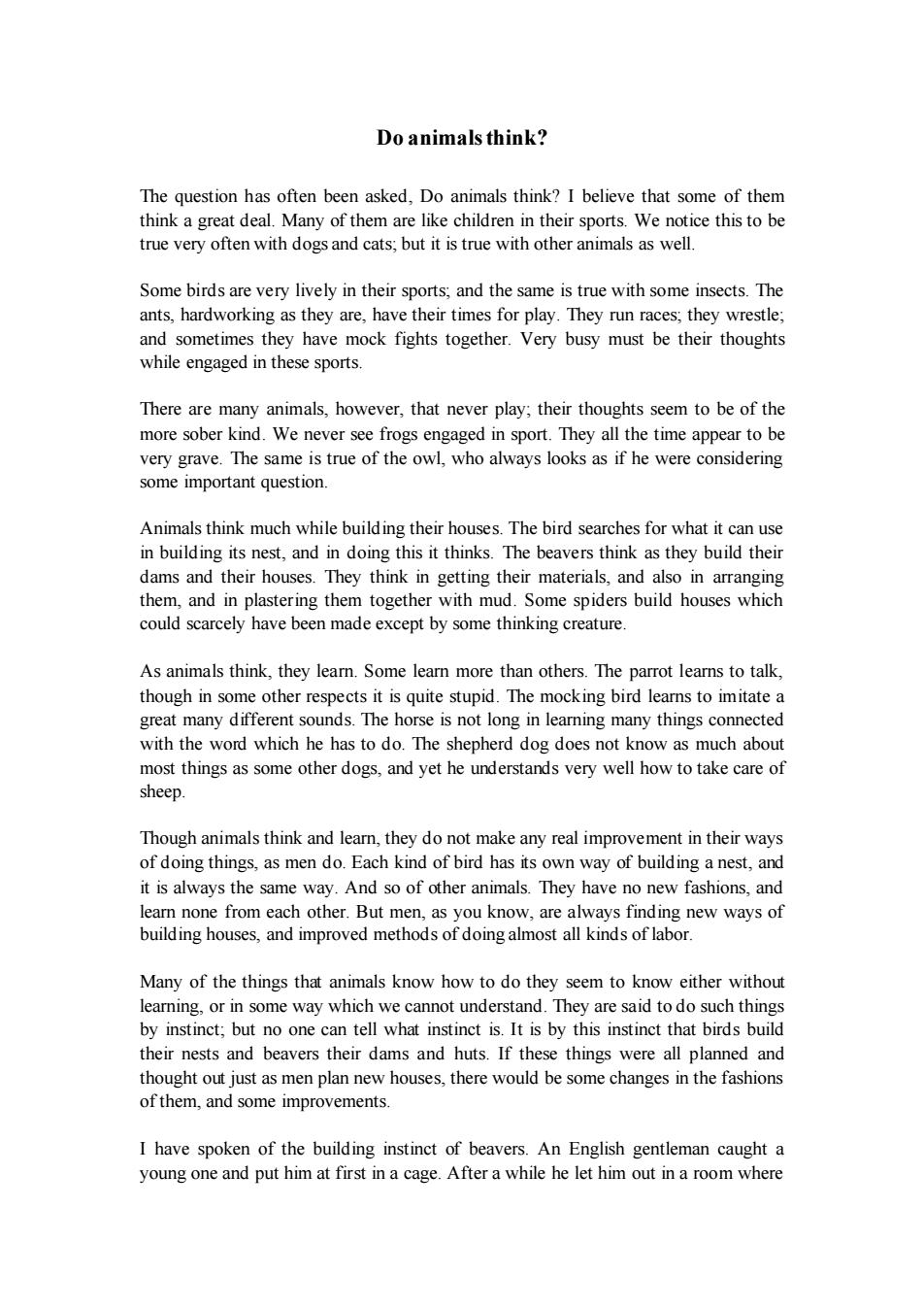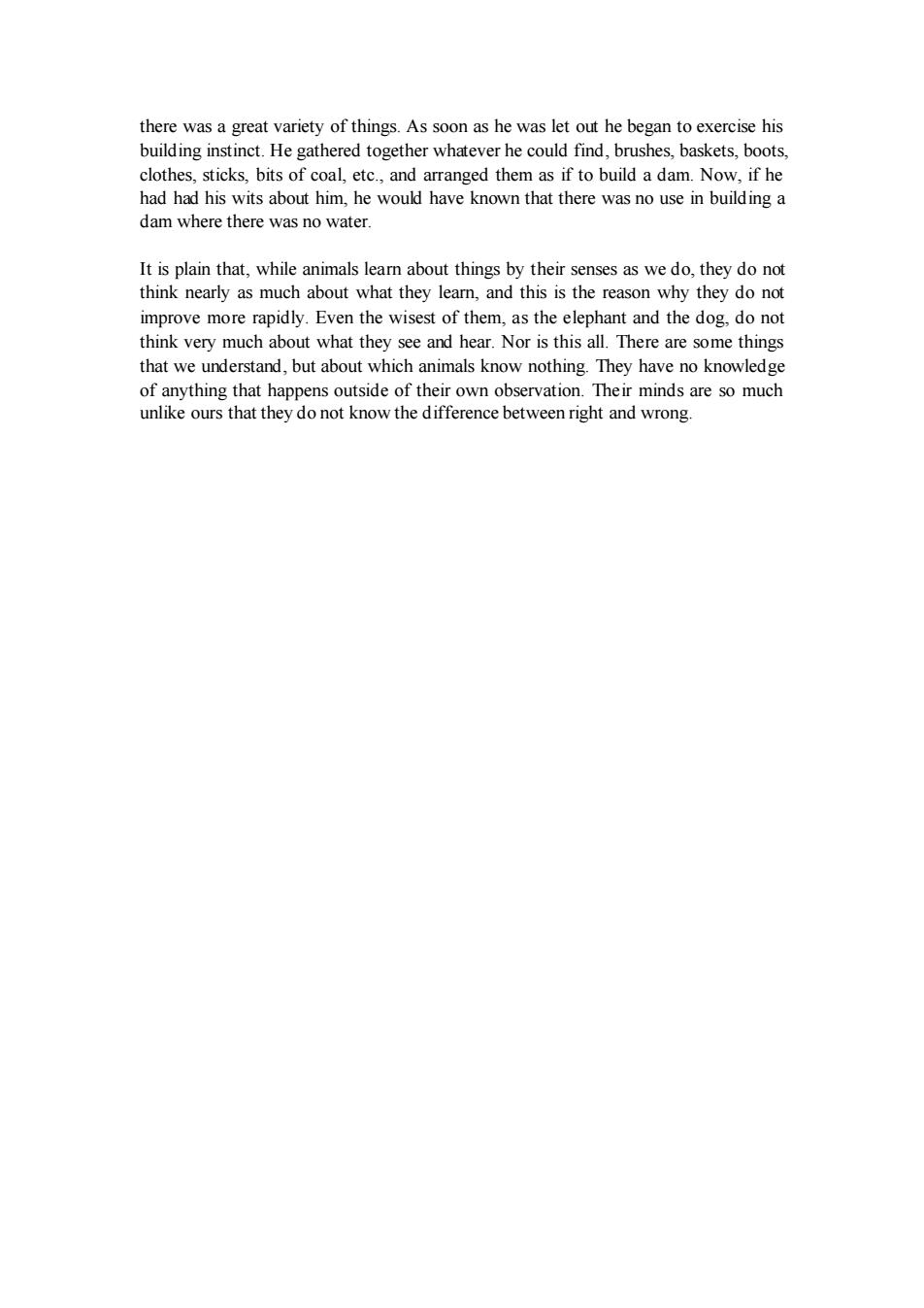
Do animals think? The question has often been asked,Do animals think?I believe that some of them think a great deal.Many of them are like children in their sports.We notice this to be true very often with dogs and cats;but it is true with other animals as well. Some birds are very lively in their sports;and the same is true with some insects.The ants,hardworking as they are,have their times for play.They run races;they wrestle; and sometimes they have mock fights together.Very busy must be their thoughts while engaged in these sports. There are many animals,however,that never play;their thoughts seem to be of the more sober kind.We never see frogs engaged in sport.They all the time appear to be very grave.The same is true of the owl,who always looks as if he were considering some important question. Animals think much while building their houses.The bird searches for what it can use in building its nest,and in doing this it thinks.The beavers think as they build their dams and their houses.They think in getting their materials,and also in arranging them,and in plastering them together with mud.Some spiders build houses which could scarcely have been made except by some thinking creature. As animals think,they learn.Some learn more than others.The parrot learns to talk, though in some other respects it is quite stupid.The mocking bird learns to imitate a great many different sounds.The horse is not long in learning many things connected with the word which he has to do.The shepherd dog does not know as much about most things as some other dogs,and yet he understands very well how to take care of sheep Though animals think and learn,they do not make any real improvement in their ways of doing things,as men do.Each kind of bird has its own way of building a nest,and it is always the same way.And so of other animals.They have no new fashions,and learn none from each other.But men,as you know,are always finding new ways of building houses,and improved methods of doing almost all kinds of labor. Many of the things that animals know how to do they seem to know either without learning,or in some way which we cannot understand.They are said to do such things by instinct;but no one can tell what instinct is.It is by this instinct that birds build their nests and beavers their dams and huts.If these things were all planned and thought out just as men plan new houses,there would be some changes in the fashions of them,and some improvements. I have spoken of the building instinct of beavers.An English gentleman caught a young one and put him at first in a cage.After a while he let him out in a room where
Do animals think? The question has often been asked, Do animals think? I believe that some of them think a great deal. Many of them are like children in their sports. We notice this to be true very often with dogs and cats; but it is true with other animals as well. Some birds are very lively in their sports; and the same is true with some insects. The ants, hardworking as they are, have their times for play. They run races; they wrestle; and sometimes they have mock fights together. Very busy must be their thoughts while engaged in these sports. There are many animals, however, that never play; their thoughts seem to be of the more sober kind. We never see frogs engaged in sport. They all the time appear to be very grave. The same is true of the owl, who always looks as if he were considering some important question. Animals think much while building their houses. The bird searches for what it can use in building its nest, and in doing this it thinks. The beavers think as they build their dams and their houses. They think in getting their materials, and also in arranging them, and in plastering them together with mud. Some spiders build houses which could scarcely have been made except by some thinking creature. As animals think, they learn. Some learn more than others. The parrot learns to talk, though in some other respects it is quite stupid. The mocking bird learns to imitate a great many different sounds. The horse is not long in learning many things connected with the word which he has to do. The shepherd dog does not know as much about most things as some other dogs, and yet he understands very well how to take care of sheep. Though animals think and learn, they do not make any real improvement in their ways of doing things, as men do. Each kind of bird has its own way of building a nest, and it is always the same way. And so of other animals. They have no new fashions, and learn none from each other. But men, as you know, are always finding new ways of building houses, and improved methods of doing almost all kinds of labor. Many of the things that animals know how to do they seem to know either without learning, or in some way which we cannot understand. They are said to do such things by instinct; but no one can tell what instinct is. It is by this instinct that birds build their nests and beavers their dams and huts. If these things were all planned and thought out just as men plan new houses, there would be some changes in the fashions of them, and some improvements. I have spoken of the building instinct of beavers. An English gentleman caught a young one and put him at first in a cage. After a while he let him out in a room where

there was a great variety of things.As soon as he was let out he began to exercise his building instinct.He gathered together whatever he could find,brushes,baskets,boots, clothes,sticks,bits of coal,etc.,and arranged them as if to build a dam.Now,if he had had his wits about him,he would have known that there was no use in building a dam where there was no water. It is plain that,while animals learn about things by their senses as we do,they do not think nearly as much about what they learn,and this is the reason why they do not improve more rapidly.Even the wisest of them,as the elephant and the dog,do not think very much about what they see and hear.Nor is this all.There are some things that we understand,but about which animals know nothing.They have no knowledge of anything that happens outside of their own observation.Their minds are so much unlike ours that they do not know the difference between right and wrong
there was a great variety of things. As soon as he was let out he began to exercise his building instinct. He gathered together whatever he could find, brushes, baskets, boots, clothes, sticks, bits of coal, etc., and arranged them as if to build a dam. Now, if he had had his wits about him, he would have known that there was no use in building a dam where there was no water. It is plain that, while animals learn about things by their senses as we do, they do not think nearly as much about what they learn, and this is the reason why they do not improve more rapidly. Even the wisest of them, as the elephant and the dog, do not think very much about what they see and hear. Nor is this all. There are some things that we understand, but about which animals know nothing. They have no knowledge of anything that happens outside of their own observation. Their minds are so much unlike ours that they do not know the difference between right and wrong